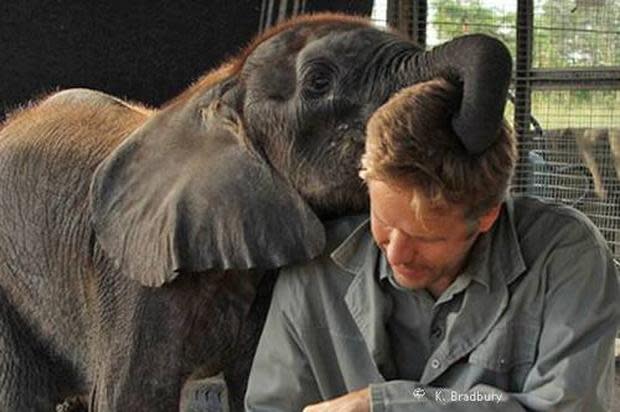Tech doing good: 10 inspiring stories on TechRepublic in 2014

Image: Great Elephant Census
This year, TechRepublic published a lot of stories about companies that use technology to solve real problems. This includes stories about technology's positive effects on the conservation efforts, technological advancements in medicine, and the increasing awareness and education about women in STEM fields.
Here are 10 stories we published this year that focused on businesses and organizations using technology for the good of the world.
1. How Jane Goodall Institute uses digital mapping to save chimp habitats in Africa, empower children in the US
The Jane Goodall Institute, named after legendary primatologist Jane Goodall, is a global non-profit that empowers people to make a difference for all living things, and this year they announced the launch of a massive open online course (MOOC) that is modeled after the digital mapping technologies already on the ground in Africa to prevent deforestation. JGI is also using digital mapping to empower children in the US to be the Jane Goodall of their own communities with their Roots and Shoots program, by giving them the tools to find out what their ecosystems are missing and how to change it.
2. PowerToFly connects women around the world to tech companies that need talent
PowerToFly is a new startup that was founded by two women, both tech industry veterans and working mothers, who wanted to make it easier for women around the world to work remotely. The company connects women with tech jobs in the US, and is looking to expand to companies around the world.
3. Hack the gender: Womens hackathon aims to show young women a future in tech
In October, West Virginia University's Reed College of Media held a hackathon called Hack the Gender: A Women's Hackathon on Wearables. The event focused on the potential of wearables as an emerging technology and their potential in reporting and journalism. There were also panel discussions on challenges faced by women in technology. The event was a year in the works, and the group plans on doing it again, with even younger girls.
4. Technologists and conservationists are teaming up to stop Africa's elephant crisis
The Great Elephant Census is a project funded by Microsoft co-founder Paul Allen and his investment company Vulcan Inc, and Elephants Without Borders, a non-profit in Africa. It was designed to provide accurate, up-to-date data about the number and distribution of savannah elephants across 22 countries in Africa, and it is the first pan-African survey of elephants since 1979. Elephants are in grave danger of being poached to extinction, and the organizations are looking at ways to incorporate other technologies like drones and high-tech collars to track and protect the animals.
5. How an Atlanta education startup is inspiring early learning in tech and coding
Advantage Learning Cooperative & Kids 4 Coding is an Atlanta startup founded by Denise Detamore and AnnMarie Laramee. They wanted to build an enrichment center focused on tech and math to supplement what may be missing in the school setting. Starting children young on the path to digital literacy, coding, and entrepreneurship is important to the founders.
6. Significance Labs is building apps to improve the lives of low-income Americans
Significance Labs is an accelerator in New York City that incubates startups wanting to improve the lives of low-income Americans, particularly those in NYC. It's an offshoot of Blue Ridge Foundation, a funding program for nonprofits in the city. Significance Labs' first group of companies included NeatStreak, an app for domestic workers to minimize misunderstandings with clients; ReBank Me, an app that compares banking options for people that don't have many; and EasyFoodStamps, which is trying to make the government process of obtaining food stamps easier.
7. How recycled solar powered phones could save rainforests and change how the tech industry tackles climate change
Rainforest Connection is the startup behind a project that takes old smartphones, encases them in solar panels, and perches them high in trees to monitor and collect data about illegal logging in rainforests. The company fully crowdfunded its Kickstarter project earlier this year and now wants to completely transform how we understand and use technology to solve global problems.
8. With Ushahidi's global innovation engine, Africa has joined the tech revolution
The Kenyan tech startup Ushahidi created a platform to map international crises and disaster relief back in 2008 after violence following the Kenyan elections. This year they created BRCK, a rugged backup generator for the internet. It has a battery strong enough to charge other devices, plenty of memory, and ethernet and SIM card ports. Ushahidi also built Ping, a check-in tool for emergencies that can be used by anyone.
9. Business as a force for good: How benefit corps are rewriting the rules of the corporate world
Benefit corporations are for-profit entities that use their business for the good of the world. The goal of B Lab, which offers the certification process to become a benefit corporation, is to support entrepreneurs and companies who are using a business as a force for good by promoting community involvement, sustainability, and philanthropic work, and bettering employee salaries and benefits.
10. How social media rerouted over 400,000 pounds of food waste in a year
One-third of the world's food is thrown away each year, but there are a few startup harnessing the power of social media and mobile technology to revolutionize how we deal with food waste. One is Cropmobster, a California-based startup that uses an online community and mobile alerts to connect farmers who have perishable surplus food to people that will buy it.

